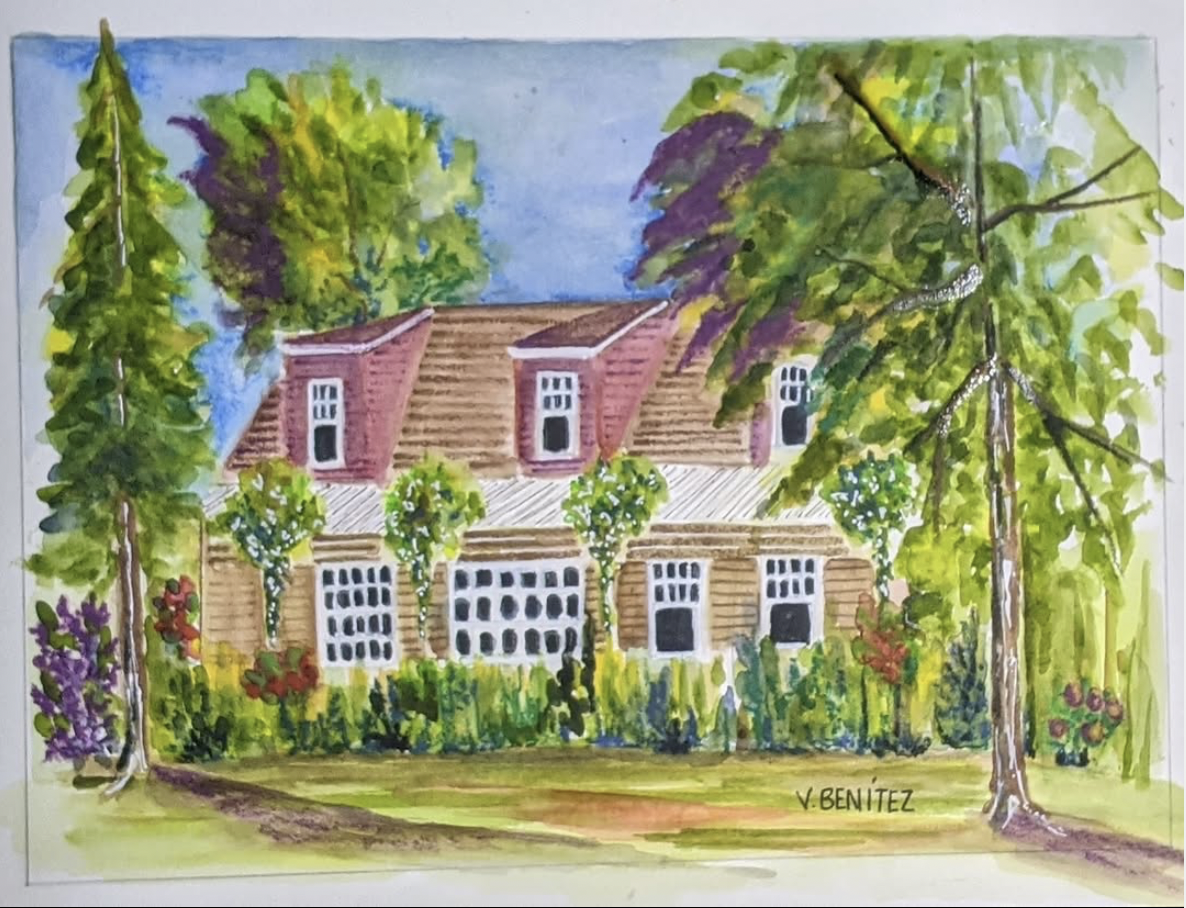On the end table next to my sofa is a small floral frame with a postcard of the above painting of Mystic Farm, my beloved best friend's beloved home in Southern California. I've visited her family there a lot since moving back West seven years ago, including several Thanksgivings and a Christmas. They love to host.
Elsewhere around my living room, my Christmas decorations are half put away. The small tabletop tree is still up, and there are bags of ornaments and bubble wrap on one end of the couch. The red plastic bins that it all goes in are sitting on a bench at the other end of the couch. The scene stands just as I left it last Tuesday evening, January 7th, when I learned that a rapidly-spreading wildfire had broken out less than a mile from Mystic. I immediately texted Annie, who confirmed that she and her family had already safely evacuated. They had seen the flames from their kitchen window. Since then, I have been glued to my phone and my laptop, communicating, researching, and watching.
I didn't sleep Tuesday night. I've barely been able to sleep or work since. I learned early Wednesday that the house was still standing as of 4:00 a.m. Pacific and held out hope, but by daybreak she was gone. I learned about the breadth of the devastation from Annie before I saw it on the news. "Everyone around us lost their homes," she texted. "As soon as it is safe, we will head up and visit what is left of her."
You can read elsewhere, or watch videos, that will explain the known facts about the fires, the unprecedented hurricane-force winds, the brush overgrowth followed by a months-long drought, the sudden extreme demand on a water system not prepared to fight this much urban fire in this many places at once. You can also read elsewhere about Altadena's history as a home for tuberculosis patients and teetotalers, about her unique and diverse historic neighborhoods, her early 20th-century Craftsman homes, her small, century-old farms and orchards, her thriving community of Black-owned businesses. You can, in other words, go learn about the vastness of what the world has lost.
Vast and devastate share a free base element, the <vast> that is unadorned in vast, but prefixed and suffixed in devastate. The <a> in the base is hard to spell based on pronunciation alone; it is schwaed and therefore could be spelled with any single vowel letter. When the vowel is stressed in vast, or in the Norman French cousin waste, it is clearly an <a>.
The same thing happens with the vowels in the Greek word family catastrophe ~ catastrophic. In each word, at least one of the vowels is schwaed but they reveal their identity when it is stressed: cat[ǽ]strophe, c[ǽ]tastr[ɑ]phic. Another favorite example from Greek is pandemonium, whose medial <e> is schwaed. It is identifiable, however, in the word demon, which shares its <demon> with <pan + demon + ium>.
Because it is an stress-timed language, English has hundreds of examples of this kind of suprasegmental phonology: vowel spelling can be revealed when they are stressed, so we look across a word family in which the stress shifts.
People aren't all that different, really. This is one of the ways that our language study can reveal our humanity to us. When stressed, people also tend to reveal their identity. Who are we when we face the worst life has to offer?
Like so many thousands of homes, Mystic Farmhouse tragically did not survive the Eaton Fire in Altadena. Like so many Altadenans, Annie and her family are showing who they really are under the unfathomable stress. The epicenter of the fire was close, and the wind moved it fast. Annie and her husband could've scooped up their daughter and their dogs and left, but instead, Annie ran to the home of their elderly neighbor, June, who lived alone across the street. The power had been out due to the high winds, so June's phone was out, and she had gone to bed early. Annie pounded frantically on June's door and screamed until she roused her; June left with Annie, her husband Ed, and their daughter, Alice, with nothing but the pajamas and slippers she was wearing.
Under the most unimaginable stress of her own life, Annie saved June's life. The rising death toll is largely elders who were unable or unwilling to leave their homes. June is a widow, has no family and no car, but she showed her smarts by leaving when Annie told her to. She has been staying with Annie and family in a B&B since the fire to the tune of more than $1000/night; costs have risen like crazy. June helps out with the dishes and the laundry, and is learning about iPhones and Stranger Things from teenage Alice.
You may have seen online, as I have, people claiming that these fires are only affecting "rich people." While parts of Altadena and much of the Palisades are affluent, they are also full of family homes purchased for pennies decades ago and passed down to children and grandchildren and great-grandchildren. They are full of modest neighborhood ranch homes, like June's, amid larger properties, like Mystic. No amount of insurance coverage can rebuild the dollhouse that Annie's grandpa built when her mom was a child. Money cannot replace albums full of family photos, her children's artwork, heirlooms from Chile, her late mom's Storybook Doll or Christmas house or crystal goblet collections, antique farmhouse fixtures, or 100-year-old pomegranate and avocado and kumquat trees. But still, Annie and Ed feel fortunate to have access to insurance and other resources to help them rebuild or replace what they can.
June, however, does not. Like many elders in California, June does not have homeowner's insurance. While I cannot say exactly why she specifically did not, it is very common in California. Insurance companies have been pulling out of the state in droves, and those that remain have selectively dropped coverage and/or hiked premiums exorbitantly over the past several years. Many older folks in the state are "land rich" in houses they've owned for decades, but they live on fixed incomes or reverse mortgages and can't pay the premiums or keep up with the requirements. Some widows never handled anything financial and find themselves unfamiliar with insurance, budgets, and investments. Regardless, June now finds herself with literally nothing, not even her husband's cremains, except for the now charred land where her home once stood.
Over the past couple of days, Annie and her husband have helped June file for FEMA. They have helped her purchase new clothes, socks, shoes and toiletries. This is on top of all they have to deal with in their own situation: insurance, jobs, lodging, their minor child, their pets. When I offered Annie my help with computer tasks, research, phone calls, and the like, Annie asked me to handle a couple of specific things for June, which I was happy to do. It's like June doing dishes and laundry: we all need to be as useful as we can.
One of my tasks was to set up a GoFundMe for June, to help her reestablish a place to live and handle her basic needs on the front end. There are a lot of GoFundMes out there, and I may selectively share another one or two, but I made this one for June, whose life was saved by one of the best people I've had the privilege to love in my life. I don't support fundraisers for honeymoons or new cars (which I have seen), but this is a tragically worthy cause. From the bottom of my heart, I am asking you to share, donate, boost, support Southern California, in whatever way you can.
Los Angeles County has a larger population than 43 of our 50 states, just shy of 10 million people. It's hard to fathom. It's vast. But we can wrap our minds around one neighbor helping another, one stressed, devastated person showing who they really are.
If you've read this far, you'll be pleased to know that I have announcements about 65 Weeks and about winter Pop-Up classes coming; those both got derailed by this past week's event. Stay tuned, and please boost this public post.

